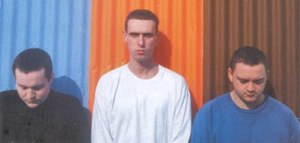Disco Inferno (band)
| Disco Inferno | |
|---|---|

(left to right): Ian Crause, Rob Whatley and Paul Wilmott
|
|
| Background information | |
| Also known as | D.I. |
| Origin | Essex, England |
| Genres | Post-rock, experimental rock, post-punk |
| Years active | 1989–1995 |
| Labels | Ché |
| Associated acts | Bark Psychosis |
| Past members | Daniel Gish Ian Crause Paul Willmott Rob Whatley |
Disco Inferno was an English experimental rock band active in the late 1980s and the 1990s. Initially a trio of guitar, bass, and drums performing in an identifiable post-punk style, the band soon pioneered a dynamic use of extensive digital sampling in addition to standard rock instruments. While commercially unsuccessful during their existence, the band is considered to be a key post-rock band.
Disco Inferno was formed in Essex in the late 1980s, by schoolboy musicians Ian Crause (guitar and vocals), Paul Wilmott (bass), Rob Whatley (drums) and Daniel Gish (keyboards). Initially Crause shared the guitar playing/singing role with a fifth (and unnamed) group member who was eventually ousted . Gish left shortly afterwards to join Bark Psychosis, leaving the band as the trio lineup they would retain until the end of their career.
The band took on the name Disco Inferno as a joke, naming themselves after the classic dancefloor track by The Trammps, which was as far from the sound of the band themselves as could be imagined. (Years later, when established as a credible alternative rock act in Britain, the band found themselves losing potential American bookings due to American agents being discouraged by the name. Crause would later describe this situation as "a joke which had long since gone sour.")
The three-piece Disco Inferno recorded the single, *"Entertainment/Arc in Round" with record producer Charlie McIntosh. Their first album, Open Doors, Closed Windows, was released in 1991 on Ché and received positive reviews. The album was characterized for having influence of late 1970s post-punk bands, particularly Joy Division and Wire. Disco Inferno's manager, Michael Collins, had previously managed Wire during the 1970s. The band's next release was the "Science" EP. (All three of these early 1990s releases would later be collected on the 1995 compilation album, In Debt).
...
Wikipedia
